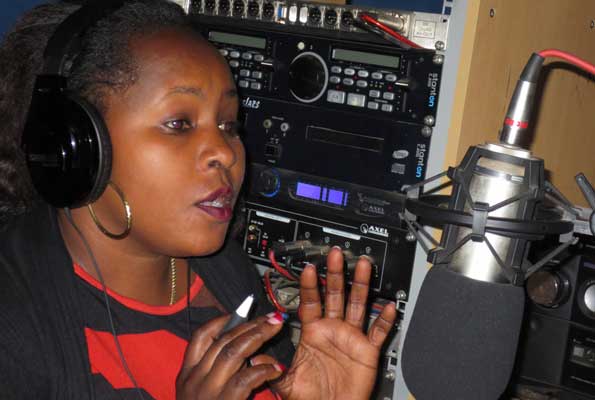Paddy Roberts | December 23, 2016
It’s Friday, a little after six o’clock. All across Tanzania, farmers are tuning in to Radio 5.
Clara Moita sits in a blue, soundproofed studio in Arusha, nodding her head in time to the music coming through her headphones. A light flashes on the console in front of her and her mobile phone comes to life. She checks that the phone is properly connected to the equipment, then nods at her colleague, who fades the music.
Before answering the phone, Ms. Moita says, “Some people call regularly, but I don’t recognize this number.”She gestures for silence in the studio and then answers cheerfully, “Hello, caller! What is your question?”
Radio 5 has aired farming programs for several years. Ms. Moita has been presenting and producing Farhari yangu or “My pride” since the show began in 2013. The program focuses on northern Tanzania, but Radio 5 broadcasts nationwide and farmers phone in from across the country.
Farhari yangu is currently encouraging farmers to grow, eat, and market highly nutritious local vegetables, rich in iron and vitamin A. The station is collaborating with Farm Radio International and Irish Aid to improve household nutrition and farming incomes.
Joseph Justo chairs the Agape community listening group, based in the small village of Makiba, 40 kilometres southeast of Arusha. Mr. Justo listened to today’s show with the group.
As the program finishes, he turns off the radio and encourages group members to discuss the program. One member writes down the group’s questions and comments, which he will later send to Radio 5 via mobile phone.
When the meeting breaks up, Mr. Justo walks back to his farm. He says: “Since the program started, I have been growing [traditional, green leafy vegetables, including] mnavu, sikuma wiki (kale), and mchicha (spinach). What’s interesting is how dinner time has changed.”
He scratches thoughtfully at his grey-flecked beard with a calloused hand, then says: “If my wife makes ugali makande [a stiff white maize porridge with a meat sauce], then it has to have mchicha on the side or my children ask, ‘But mama, where is the mchicha?’” He laughs and says, “This would not have happened a year ago.”
Mr. Justo says that local vegetables have become popular, and not just with the farmers who listen to Farhari yangu. The market is usually sold out of the vegetables. People now value the nutrients in the food they eat. He says, “I have set aside [half a hectare] to grow mchicha for seed. Everyone wants to grow it, and I will make a good profit simply by selling them the seeds.”
Local agricultural extension officers help produce Farhari yangu to ensure that the information it broadcasts is correct and relevant. Shayo Fumis has been an extension officer for 30 years, and has worked for the past seven years in and around Makiba.
Mr. Fumis says radio complements the services his department offers farmers. He appreciates that farmers now see him as a link between what they hear on the radio and the practical business of planting and harvesting.
He says, “The farmers that are improving are the ones listening to radio programs like this one. The improvement comes directly from what they hear on the radio.”
Mr. Fumis continues: “It’s difficult sometimes to get farmers to change practices. But the reach of the radio means that more people who might accept new techniques, crops, or ideas get a chance to hear about them.”
Back at Radio 5, Ms. Moita is tidying up her desk. She says: “What is satisfying is that farmers understand what I broadcast, or they call up for further explanation. And,” she adds with a smile, “When I go out to their farms for interviews, I can pick up really fresh vegetables.”
This story originally appeared in March 2015.
